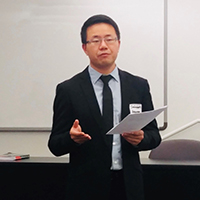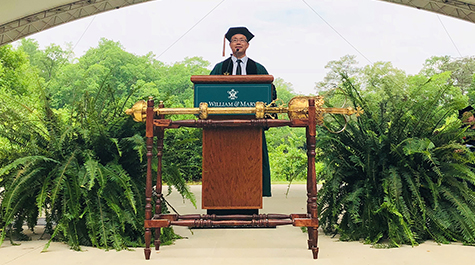Lin Wang LL.M. '18 Talks About the Journey That Led Him to Virginia and William & Mary
Lin Wang graduated from William & Mary Law School in May 2018, after completing studies for his LL.M. degree. The following story describes why he chose to study at William & Mary, what he learned here, and his advice for future LL.M. students.
A Lawyer's Life in China
Like other students in the LL.M. program, Wang completed his foundational legal degree in his native China and enjoyed a very successful law career before traveling to Williamsburg and the Law School for additional studies and training.
He practiced as a corporate lawyer for 10 years in Beijing, and served as in-house counsel for China General Nuclear Power Corporation, a corporation which builds nuclear plants and mines uranium around the world. Wang reviewed contracts and compliance from a Chinese perspective in international trade deals involving uranium. He provided legal opinions on large-project finance transactions, including a joint venture for a manufacturing fuel assembly operation in Kazakhstan. This highly global transactional work meant Wang had to review English-language contracts on a daily basis. He had an increasing number of interactions with English-speaking lawyers and different foreign parties in negotiations, and knew he would benefit from gaining a deeper understanding of the way in which people think depending on the culture in which they live and work. As a result, Wang set his mind on an LL.M. degree in the United States.
A Journey Leading to Virginia and William & Mary Law School
He applied to and was admitted to a number of law schools across the United States, in locations from Boston to Berkeley, California. Wang chose to further his studies in William & Mary’s LL.M. program. He had a connection with the school through a Chinese acquaintance which helped him form his decision. The acquaintance was classmate of his wife's who had completed her LL.M. degree at William & Mary in 2006. Her accounts of the “lovely, small town” enthused Wang. He wanted a change of life away from the city—a new “life pattern” of a slower pace with quiet streets. William & Mary offered Wang a scholarship and his final decision to journey to Williamsburg, Virginia, for his studies was an easy one.
 He had traveled to the U.S. three times before for brief trips, exploring as much as he could by car. His LL.M. studies would be his first time living in a foreign country for such an extended period. His degree would comprise a one-year journey, not a two-week road trip. The LL.M. program at William & Mary marked the first time he encountered a diversity of people from around the world in the classroom. His classmates in the program ranged in their nationalities: Italian, Saudi Arabian, Bulgarian, Afghani, and Indian. The program at William & Mary gave him the opportunity to speak to native speakers and also establish lasting relationships with students of varied backgrounds. He remains connected with his Bulgarian classmate, who is now working at a cyber security law office in D.C., and his Afghani classmate, who will be sitting for the bar examination in January.
He had traveled to the U.S. three times before for brief trips, exploring as much as he could by car. His LL.M. studies would be his first time living in a foreign country for such an extended period. His degree would comprise a one-year journey, not a two-week road trip. The LL.M. program at William & Mary marked the first time he encountered a diversity of people from around the world in the classroom. His classmates in the program ranged in their nationalities: Italian, Saudi Arabian, Bulgarian, Afghani, and Indian. The program at William & Mary gave him the opportunity to speak to native speakers and also establish lasting relationships with students of varied backgrounds. He remains connected with his Bulgarian classmate, who is now working at a cyber security law office in D.C., and his Afghani classmate, who will be sitting for the bar examination in January.
During the LL.M. program, Wang enrolled in a myriad of courses including Civil Procedure, Property, Evidence, Constitutional Law, Business Associations, and Legal Writing/Lawyering Skills.
“The program provided me with all the needed knowledge on how American attorneys think,” said Wang, including “how they analyze situations, legal issues, their critical legal logic.” Wang hopes to use this knowledge in his future legal practice to better understand how the “other side” thinks, what forms their opinions, and how to reconcile the conflict between opposing sides and reach agreements. William & Mary provided him with the cultural awareness needed for international legal professionals, he said. Above all, Wang recalls the LL.M. faculty with whom he established strong relations: “Professor Stevenson and Professor Rosenberg gave us helpful advice on studying here and advice for job hunting. Brenda Stone did many things not within her responsibilities to make students feel comfortable.”
While Wang misses his home country, he hopes to extend his stay. “I like the people here…they are really friendly and easy to get along with,” said Wang. “The one year passes by so fast. Just as you start to understand American life, you’re already at the commencement ceremony.”
Wang gave a speech at the Law School ceremony as the representative of the LL.M. student body. In his remarks, he noted that law school is just the beginning of a new life and career, and that students can use what they have learned to solve real-world problems as citizen lawyers. After spending the summer studying, he took the bar examination last July.
He advises future LL.M. students to “start preparing as early as [you] can" for the bar. Wang followed the Barbri study schedule. The exam, he said, was not “just a test for qualification…it was a test to ensure the time I spent was worth it.” He is currently working at a small law firm in Williamsburg that focuses on litigation and is trying to expand its caseload to international business transactions.
Wang has advice for future LL.M. students: “You have to be positive. Push yourself to talk with others and get involved with the activities here. There are many ways to avoid feeling like an isolated community." He encourages new students to take the initiative and talk to others studying at the Law School as a way to get to know new people and to give them a chance to get to know you.
About William & Mary Law School
Thomas Jefferson founded William & Mary Law School in 1779 to train leaders for the new nation. Now in its third century, America's oldest law school continues its historic mission of educating citizen lawyers who are prepared both to lead and to serve.
